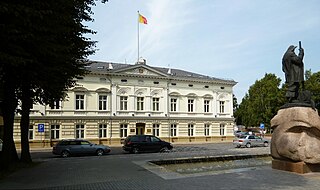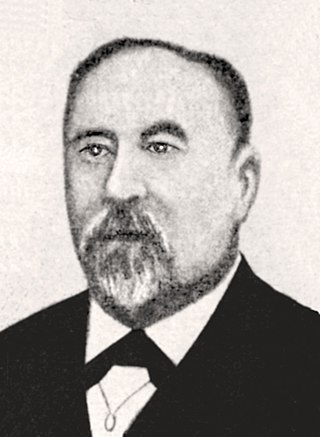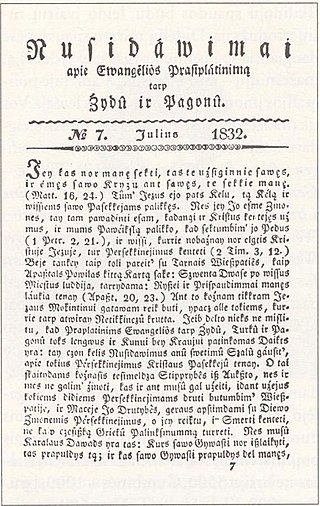
Rambynas is a hill on the right bank of the Neman River in Rambynas Regional Park, Pagėgiai Municipality, western Lithuania. The current hill, about 46 metres (151 ft) above sea level and about 40 metres (130 ft) above the Neman, is a remnant of the larger hill that was destroyed by erosion. The hill was known as sacred among locals and played a role in the ceremonies of pagan Lithuanians. It is featured in many local legends and is protected by the state as a mythological object. A large stone at the top of the hill, known as the altar stone, was destroyed by a miller in 1811. Rambynas became popular with Prussian Lithuanians at the end of the 19th century who organized various events, most notably celebrations of the Saint Jonas' Festivals or Rasos, on the hill. They rebuilt the altar in 1928. The hill is popular with Lithuanian neo-pagans and hosts the annual celebrations of the summer solstice on 23 June.
Lietuvininkai we are born is a Lithuanian-language patriotic and sentimental poem written by the German linguist Georg Sauerwein in 1879. It is a passionate defense of Prussian Lithuanian (Lietuvininkai) language and culture, rallying people to resist Germanisation attempts. However, at the same time the poem proclaimed love and loyalty to the Kaiser signifying that the rally was cultural and not political. It was inspired by Enlightenment ideas that archaic languages and traditions of minorities should be cherished, studied, and preserved. The poem was first published in the Prussian Lithuanian newspaper Lietuwißka Ceitunga in 1879.

The Battle of Krücken was a medieval battle fought in 1249 during the Prussian Crusades between the Teutonic Order and Prussians, one of the Baltic tribes. In terms of knights killed, it was the fourth largest defeat of the Teutonic Knights in the 13th century.

Erdmonas Simonaitis was a Prussian Lithuanian activist particularly active in the Klaipėda Region and advocating its union with Lithuania. During the staged Klaipėda Revolt of 1923, he headed the pro-Lithuanian government of the region. For his anti-German activities, he was persecuted by the Nazis during World War II. He survived the Mauthausen-Gusen and Dachau concentration camps. After the war he remained in Germany and rejoined various Lithuanian organizations. He was awarded the Order of Vytautas the Great and Order of the Lithuanian Grand Duke Gediminas.

The Parliament of the Klaipėda Region was the parliament of the Klaipėda Region, an autonomous region of Lithuania. The parliament was established by the Klaipėda Convention of 1924 and the first elections took place in October 1925.
The Lietuwißka Ceitunga was an influential Lithuanian-language newspaper published for Prussian Lithuanians, an ethnic minority of East Prussia, a province of the German Empire. It was established in 1877 by Martynas Šernius and Heinrich Holz in Klaipėda (Memel) and continued to be published until September 30, 1940.

Jonas Smalakys (1835–1901) was a Prussian Lithuanian landowner, soldier, and the first Prussian Lithuanian to be elected to the Reichstag.
The Lithuanian Conservative Election Societies were several loosely connected political societies of Prussian Lithuanians active from 1890 to the German Revolution of 1918–19. They sought to elect Prussian Lithuanians to the German Reichstag and Prussian Landtag and to defend the use of the Lithuanian language. The societies managed to get two representatives to the Reichstag and two to the Landtag. It is sometimes described as the first Lithuanian political party.

The Birutė Society was the first cultural non-religious society of Prussian Lithuanians. Established in 1885 in Tilsit, East Prussia, the society was intermittently active until the outbreak of World War I. The society sought to preserve Lithuanian language and culture and protect them form Germanization. While it discussed linguistic and cultural subjects, the society never raised issues of social inequality or protested against the political regime of Kaiser Wilhelm II. The society prompted the division of Prussian Lithuanians into two main groups: religious conservative versus secular liberals. Birutė is best remembered for organizing festivals and celebrations that featured Lithuanian-language performances of various folk and patriotic songs as well as amateur theater performances, including the first Lithuanian-language theater performance in 1895.

Dovas Zaunius was a Prussian Lithuanian cultural and political activist. He supported Lithuanian book smugglers and sheltered Lithuanian activist fleeing the Tsarist police. He was chairman of Birutė Society which organized Lithuanian cultural events and managed the budget of the Lithuanian newspaper Varpas from 1900 to 1905. In 1890, Zaunius co-founded the first of the Lithuanian Conservative Election Societies that sought to elect Prussian Lithuanians to the German Reichstag and Prussian Landtag. Zaunius unsuccessfully ran in the Reichstag elections three times.
Tėvynės sargas was a Lithuanian-language periodical first established in 1896 in Tilsit, East Prussia during the Lithuanian press ban and the Lithuanian National Revival. It was published by the clergy and later by the Christian Democrats, thus it reflected and advocated for Roman Catholic ideals and values. Its motto was "All for Lithuania, Lithuania for Christ". With interruptions, it was published until 2000.

Nusidavimai apie evangelijos prasiplatinimą tarp žydų ir pagonių was the second Lithuanian-language periodical. It was published from 1832 to August 1914 in Königsberg, East Prussia, by the Evangelical Missionary Society of Königsberg and mainly reported on Evangelical missions in Asia, Africa, South America. It was discontinued due to the outbreak of World War I.

Bitėnai is a small village in the Pagėgiai Municipality, in western Lithuania. According to the 2011 census, it had population of 76, a decline from 119 in 2001. It is situated along the Neman River near the Rambynas hill and is known as the location of the Martynas Jankus printing press. Jankus Museum and the visitors' center of the Rambynas Regional Park are located in the village.

Dovas Zaunius was a Lithuanian lawyer, politician and diplomat who served as Ambassador to Switzerland from 1925 until 1927 and Lithuanian Foreign Minister from 1929 to 1934.

Jonas Kriaučiūnas was a Lithuanian activist during the Lithuanian National Revival mostly noted for editing and publishing Lithuanian periodicals Varpas and Ūkininkas in 1891–1895 and Vilniaus žinios in 1905–1906.

Keleivis iš Karaliaučiaus broliams Lietuvininkams žinias parnešas was a Lithuanian-language weekly periodical published in Königsberg, East Prussia, from 1849 to 1880. It was one of the first Lithuanian periodicals. Edited and published by the linguist and Lutheran pastor Friedrich Kurschat, Keleivis was politically conservative and propagated religious values.

Vilius Gaigalaitis or Wilhelm Gaigalat was a Lutheran priest and Prussian Lithuanian activist. He was a member of the Prussian House of Representatives (1903–1918), director of the consistory of the Evangelical Lutheran Church in Lithuania (1925–1933), and professor at Vytautas Magnus University (1925–1936).
Sandora Society was a charitable, cultural, and educational society active in Lithuania Minor from 1904 to 1940. Its long-term chairman and leader was Lutheran priest Vilius Gaigalaitis. Based in Klaipėda (Memel), it supported Prussian Lithuanian activities as a counterweight to Germanization efforts. The society supported religious education for the youth, provided charitable aid to the elderly, organized church choirs, published monthly Pagalba as well as religious and educational books. It had a rich library which had about 7,000 books by 1937. Sandora and its institutions were closed after the German takeover of Klaipėda Region in 1939. The society was reestablished by Lutheran priests in 1989–1995.

Kristupas Lekšas was a Prussian Lithuanian activist from Klaipėda Region.

Marta or Morta Zauniūtė was a Lithuanian press activist in Lithuania Minor. She is best remembered as the administrator of Lithuanian newspapers Varpas, Ūkininkas, and Naujienos from 1900 to 1905. Due to the Lithuanian press ban, these publications were printed in East Prussia and smuggled to Lithuania.















